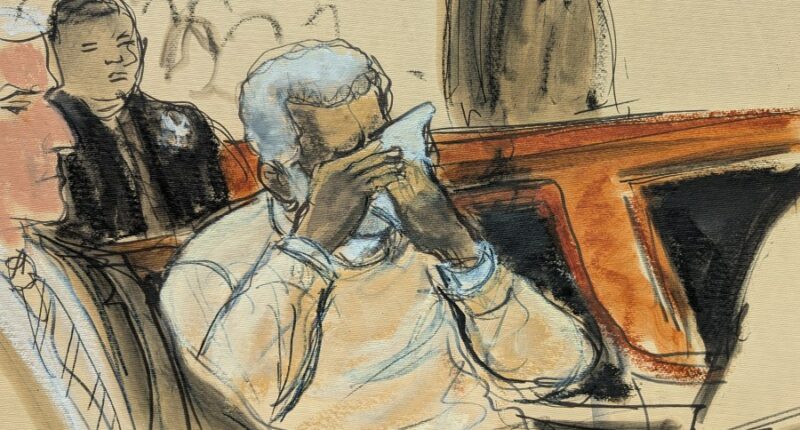Share this @internewscast.com

NEW YORK (AP) — Sean “Diddy” Combs was sentenced Friday to four years and two months in prison for transporting people across state lines for sexual encounters. This verdict concludes a troubling federal case filled with intense testimony, marking a significant moment for one of hip-hop’s foremost icons.
Combs, having spent a year in jail already, could be released in approximately three years. Prosecutors had pushed for a sentence exceeding 11 years, while his legal team argued for his immediate release, noting his prison time had already inspired his remorse and commitment to sobriety.
He was found guilty in July of arranging travel for his girlfriends and male sex workers nationwide, facilitating substance-induced sexual encounters over several years. He was, however, cleared of sex trafficking and racketeering charges, which could have led to a life sentence.
Judge Arun Subramanian questioned why Combs’s actions persisted so long, stating, “Because you had the power and the resources to keep it going, and because you weren’t caught.”
Subramanian also imposed the maximum fine of $500,000 on Combs and praised the bravery of the accusers who testified, saying they represented many more who faced similar abuse: “You gave them a voice. You stood up to power.”
Sitting silently at the defense table, Combs listened intently to the judge’s remarks. Unlike earlier in the day, he appeared withdrawn and somber, his previous engagement with his lawyers and family visibly diminished.
“I’m sorry, I’m sorry,” he said to his family right before leaving the courtroom.
Combs’ lawyers said they’ll appeal.
“What we feel today is that the judge acted as a 13th juror, one we did not choose, and that he second guessed the jury’s verdict,” defense lawyer Marc Agnifilo told reporters after leaving court.
Before sentencing, Combs wept as his defense lawyers played a video portraying his family life, career and philanthropy, and he went on to make a plea for leniency.
“I ask your honor for a chance to be a father again,” Combs said, “a son again … a leader in my community again … for a chance to get the help that I desperately need to be a better person.” He apologized to the people he hurt physically and mentally with his “disgusting, shameful” actions, and said the domestic violence was a burden he would carry for the rest of his life.
His nearly two-month trial in a federal court in Manhattan featured testimony from women who said Combs beat, threatened, sexually assaulted and blackmailed them. Prosecutor Christy Slavik told the judge Friday that sparing Combs serious prison time would excuse years of violence.
“It’s a case about a man who did horrible things to real people to satisfy his own sexual gratification,” she said. “His currency was control. And he weaponized that currency to devastating effects on the victims.”
Combs was convicted under the Mann Act, which bans transporting people across state lines for any sexual crime. Defense attorney Jason Driscoll argued Friday the law was misapplied.
During testimony at the trial, former girlfriend Casandra “Cassie” Ventura told jurors that Combs ordered her to have “disgusting” sex with strangers hundreds of times during their decade-long relationship. Jurors saw video of him dragging and beating her in a Los Angeles hotel hallway after one such multiday “freak-off.”
“While nothing can undo the trauma caused by Combs,” Cassie’s attorneys, Douglas Wigdor and Meredith Firetog, said in a statement, “the sentence imposed today recognizes the impact of the serious offenses he committed.”
Another woman, identified as “ Jane,” testified she was pressured into sex with male workers during drug-fueled “hotel nights” while Combs watched and sometimes filmed.
Combs’ lawyers argued at trial that the government was trying to criminalize consensual, if unconventional, sexual tastes.
The only accuser scheduled to speak Friday, a former assistant known as “Mia,” withdrew after defense objections; Slavik accused Combs’ attorneys of “bullying” the woman. She has accused Combs of raping her in 2010 and asked the judge in a letter for a sentence that reflects “the ongoing danger my abuser poses.”
Six of Combs’ seven children addressed the judge, pleading for mercy for their father. One daughter, D’Lila Combs, said she feared losing her father after the death of her mother, Kim Porter, in 2018.
“Please, your honor, please,” D’Lila said through tears, “give our family the chance to heal together, to rebuild, to change, to move forward, not as a headline, but as human beings.”
Outside the courthouse, journalists and onlookers swarmed, echoing scenes from Combs’ trial.
Sade Bess, a Combs fan from Brooklyn, left the court’s overflow observation room looking both sad and relieved.
“It’s devastating to see a pioneer of the Black community’s legacy nearly diminished,” she said. “But the judge showed mercy by giving him a second chance, while still honoring the victims.”
___
Associated Press writers Liseberth Guillaume in New York and Dave Collins in Hartford, Connecticut, contributed to this report.











